You know when you’re a young child growing up and your teachers at school or church tell you everyone was created equally and should be respected as such? Well that’s BS when it comes to World Cup winners.
FIFA has put on 21 World Cups dating back to 1930. In them we’ve had deserving World Cup winners like Brazil in 1970 and Spain in 2010 and some underdog World Cup winners like Uruguay in 1950 or West Germany in 1954.
Which World Cup winners are the best and which are the worst? We dug through all the details of a near century of football to rank all World Cup winners from worst to best.
We’re not here to say whether or not these World Cup winners were deserving (we did that here), merely to determine which teams were the most impressive in their days. Obviously if 2014 champion Germany played 1930 champion Uruguay, the Germans would crush the original champ with their far more advanced equipment, fitness and tactics.
Instead we compare each of the World Cup winners based on how strong they were against contemporary competition.
The18’s Ranking Of World Cup Winners
No. 21 — Uruguay 1950
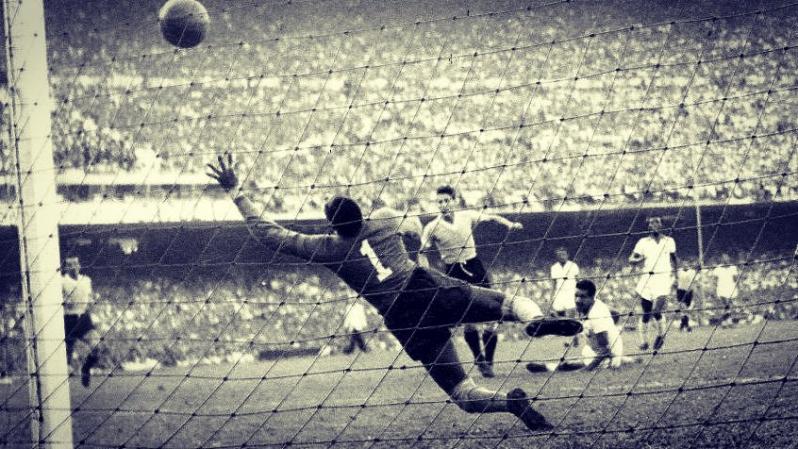
Uruguay comes in with the lowest ranking of all 20 World Cup winners. Photo: @buamdenjorge | Twitter
Someone has to be the worst, right? No team has ever had to do less to win a World Cup than Uruguay in 1950, with its only outstanding performance a 2-1 upset of Brazil in the final match of the final group stage to win it all.
Uruguay lucked into a two-team group and only had to beat lowly Bolivia to reach the second group stage. There La Celeste drew 2-2 with Spain, the only point the Spaniards earned in that stage, and scored two late goals to edge Sweden 3-2. The de facto final saw Uruguay again rally from a goal deficit to stun about 200,000 fans at the Maracanã to win it all.
Despite this ranking, Uruguay was a quality team. Greats like Alcides Ghiggia — who scored the winner against Brazil and later claimed to be one of three people to silence the Maracanã alongside the Pope and Frank Sinatra — Oscar Miguez, Pepe Schiffiano and captain Obdulio Varela were not cowed by facing Brazil, which in itself must be commended.
No. 20 — West Germany 1954
It would be impossible to say any team that lost 8-3 in a group-stage match could be one of the best World Cup winners in history. The West Germans didn’t break into positive goal differential until the semifinals and were the ultimate underdog World Cup winner.
West Germany regrouped masterfully after the devastating 8-3 loss to Hungary in its first match and the 6-1 win over a strong Austria side in the semifinals showed how strong the Germans were. But in truth the team was helped out by an injury to the legendary Ferenc Puskás and was nearly blitzed in the final, surrendering two goals within eight minutes. But Hungary took its foot off the gas just slightly and West Germany capitalized, giving Germans something to be proud of for the first time since the end of World War II.
No. 19 — Italy 1938
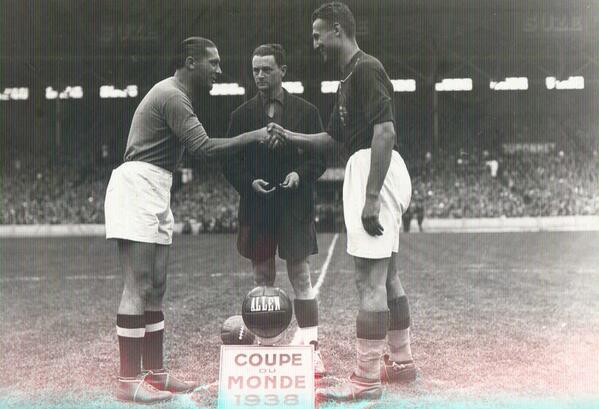
Italy claimed the second of back-to-back World Cup titles in 1938. Photo: @Theleaguemag | Twitter
In a straight knockout tournament, Italy was fortunate to take advantage of some overconfidence from Brazil to win a second straight World Cup.
While the Italians knocked out host France in the quarterfinals and a strong Hungary side that had cruised through the semifinals by outscoring opponents 13-1 in the final, Italy was lucky against Brazil. The Seleção opted to rest Leônidas, who had scored five goals in the first two rounds, in the semifinal against Italy, confident they’d still reach the final. Instead, the Azzurri prevailed 2-1.
Italy’s plus-six goal differential at the end is tied for the lowest of any of the World Cup winners (Italy 1982, Spain 2010).
Italy did become the first non-host to win the tournament, but was aided by both Uruguay and Argentina refusing to enter in protest of a second straight tournament in Europe.
No. 18 — Uruguay 1930
While we hate to bash on Uruguay again because for a country of its size to have won two World Cups is truly impressive, the truth is these were early editions with odd quirks that helped La Celeste.
In the very first World Cup, Uruguay had the benefit of serving as host, which undoubtedly affected the results. In the final against Argentina, so fervent were the fans that the only way to get John Langenus to agree to referee the match was to ensure he’d have a boat waiting to whisk him out of Montevideo as soon as the match ended.
Uruguay also had an easy first group with Peru and Romania before routing a solid Yugoslavia team 6-1 in the semifinals. The 4-2 win over Argentina showed Uruguay was certainly deserving of winning the first World Cup, but given the curious circumstances around the victory it’s hard to claim La Celeste were among the best World Cup winners.
No. 17 — Italy 2006
If you like defense and arguing with referees, you’ll disagree with us on this one. Italy allowed two goals in seven matches, an impressive feat to be sure, but the Azzurri were fortunate in so many matches it’s hard to rate them much higher than this.
Italy was the only team in the 2006 tournament to earn two straight red cards and it could be argued the team deserved more. Nonetheless, the Azzurri remonstrated with officials constantly throughout the tournament, endearing themselves to no one.
After an ugly group stage that saw Daniele De Rossi suspended four matches for a brutal elbow on Brian McBride, Italy squeaked past Australia with a controversial penalty kick in the Round of 16. A 3-0 quarterfinal win over Andriy Shevchenko and Ukraine was one of the few impressive results for the Italians. They then needed extra time to knock out host Germany and penalties (and a Zinedine Zidane red card) to see off France in the final.
Italy’s defense led by Fabio Cannavaro and Gianluigi Buffon was absolutely remarkable. But the way in which Italy went about winning the World Cup is the reason the 2006 Azzurri rank so low.
No. 16 — Italy 1934
Italy’s 1934 side was one of the least dominant World Cup winners in the history of the tournament. Outside of a 7-1 win over the United States in the first round of the straight knockout tournament, the Azzurri barely eked their way through each round despite playing at home.
While Italy’s path to the final was daunting, its performances were not. They needed a replay to beat Spain, scored a single goal to beat Austria 1-0 and didn’t see off Czechoslovakia in the final until extra time.
It doesn’t help Italy’s standing that reigning champion Uruguay refused to participate in protest of many Europeans not traveling to their first World Cup four years prior. Plus, Benito Mussolini reportedly picked referees himself, obviously favoring pro-Italian officials.
No. 15 — England 1966
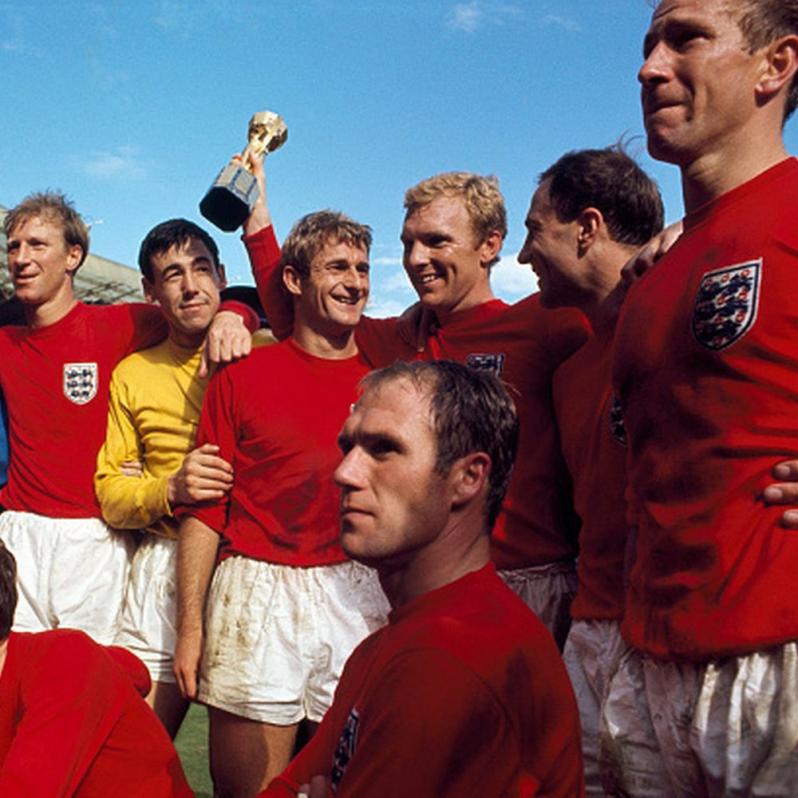
England's lone World Cup winners. Photo: @RetroFC | Twitter
England’s 1966 team was probably the country’s best ever. Players like Bobby Moore, Bobby Charlton, Gordon Banks and Ray Wilson were among the best in the world.
But, you know, there was that goal.
Geoff Hurst’s goal that wasn’t prevents England from ranking higher on this list, not to mention England’s only World Cup victory came on home soil.
Aside from the questionable win over West Germany in the final, England’s only notable victory in the tournament was a 2-1 win over Portugal and Eusébio in the semifinals as the Three Lions were the only team to slow down the Black Panther. Eusébio finished with nine goals, just two less than England’s six-match haul, in a tournament boycotted by most of Africa.
No. 14 — Argentina 1978
In terms of what Argentina accomplished on the pitch, La Albiceleste were deserved winners, outscoring opponents 15-4. However, it’s everything else that keeps these Argentines from ranking higher.
A military junta had recently taken over Argentina’s government and was not exactly a gracious host. There were countless questionable officiating calls, Dutch legend Johan Cruyff refused to participate and even Argentina players were reportedly threatened by their own government. There have been allegations that Argentina’s 6-0 win over Peru, a score that allowed the host nation to advance over Brazil on goal differential, was fixed. And there was an uncomfortable amount of gamesmanship in the final.
Argentina had a strong team in 1978 — one of the best. But because of everything that surrounded this tournament, it’s hard to see how La Albiceleste would have won it all had the tournament been played anywhere else.
No. 13 — Italy 1982
The Italians are the only World Cup winners to go through the first group stage without winning a match. In Spain 1982, the Azzurri drew all three matches in a group with Poland, Cameroon and Peru — none of them world-beaters.
That said, Italy improved dramatically as the tournament progressed. They beat Argentina and Brazil in the second group stage before topping Poland in the semifinals and West Germany in the final.
The 1982 Italians were led by Paolo Rossi, who scored a tournament-best six goals to earn the Golden Boot and Golden Ball.
Interestingly, 1982 was the only World Cup in which both the Netherlands and Mexico did not qualify.
No. 12 — West Germany 1974
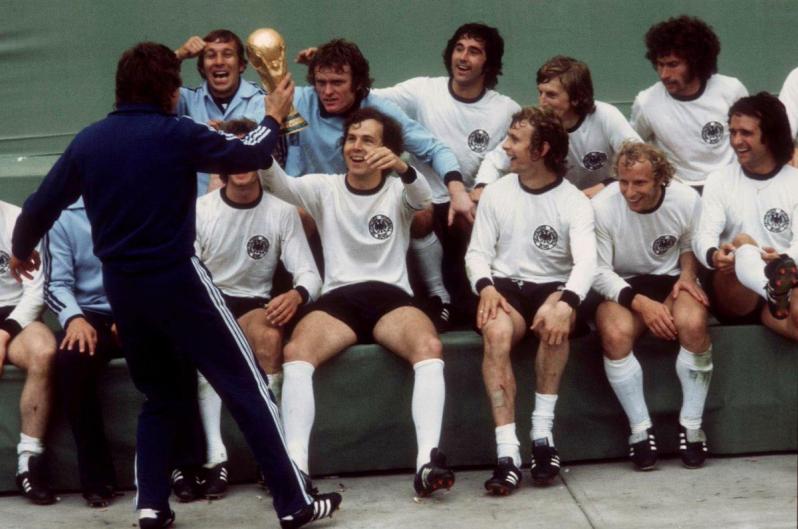
Johan Cruyff and the Netherlands were more memorable than these World Cup winners. Photo: @Squawka | Twitter
West Germany hosted the 1974 World Cup and suffered the ignominy of losing to East Germany in the group stage. (East Germany’s only other World Cup victory before reunification came against Australia.)
West Germany used the stunning defeat to its Communist rival in the midst of the Cold War to rethink its strategy, winning all four of its remaining matches.
But the 1974 World Cup wasn’t about West Germany winning on its home soil; it was about Johan Cruyff and the Netherlands. The Dutch played scintillating football, racking up a tournament-best plus-12 goal differential, scoring more goals and allowing fewer than West Germany. Plus, West Germany finished with the same record as Poland (six wins, one loss), which also had a greater goal differential.
No. 11 — Brazil 1994
Brazil’s 1994 World Cup win was easily its most pragmatic, though few would begrudge the approach after going five tournaments without a world championship. Nonetheless, Brazil outscored opponents 11-3, at the time the fewest allowed by a World Cup winner.
Brazil was workmanlike in the group stage, only dropping points in a draw with Sweden that was enough to see the Seleção advance as group winners. They then beat host U.S., the Netherlands, Sweden and Italy on the way to the crown, aided by the Italians missing three of five penalty kicks.
Romário was rightfully named the tournament’s best player while midfielder Dunga and defenders Jorginho and Márcio Santos also earned spots on the all-tournament team. Brazil was also awarded the FIFA Fair Play Trophy and the Most Entertaining Team.
No. 10 — France 1998
Most will remember France’s incredible 3-0 win over Brazil in the final as proof that this was an incredible team, but Les Bleus were quite pedestrian in the knockout rounds prior.
France dominated its group with nine goals scored and one conceded in a group including Denmark, South Africa and Saudi Arabia. From there, France needed a golden goal against Paraguay, penalties against Italy and a second-half brace from right back Lillian Thuram to rally against Croatia 2-1.
But France did finish with an impressive plus-13 goal differential while allowing a paltry two goals, joint best defensive performance in World Cup history (Italy 2006 and Spain 2010).
No. 9 — West Germany 1990
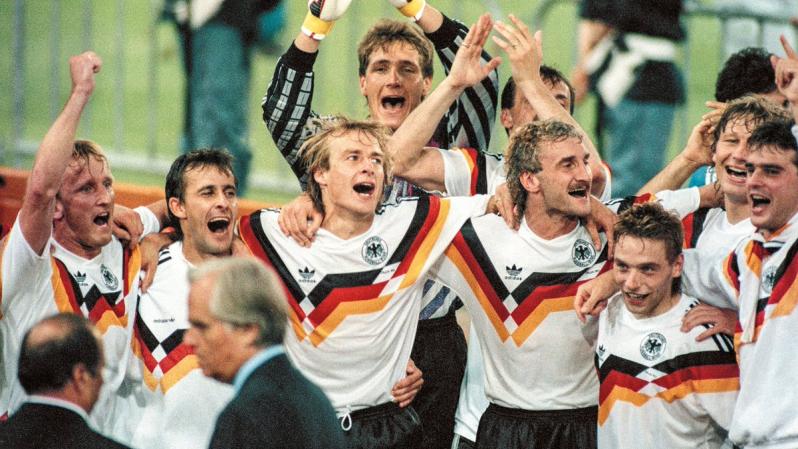
Are these the best uniforms for World Cup winners or the worst? Photo: @bayer04_en | Twitter
While the final of the 1990 World Cup was anything but thrilling, West Germany was loaded in 1990 and successfully kept Diego Maradona from leading Argentina to a second straight World Cup. With the likes of future USMNT coach Jürgen Klinsmann, Lothar Matthäus, Rudi Völler and Andreas Brehme, West Germany outscored opponents 15-5.
The 1990 tournament had a strong field, with Argentina, Italy and England all legitimate World Cup contenders in the semifinals. West Germany needed penalties to see off England before a penalty kick goal in the 85th minute from Brehme lifted West Germany to the title and avenged a loss to La Albiceleste in the 1986 final.
The biggest downside of this team was it didn’t get to face Italy, perhaps the next best team at the tournament.
No. 8 — France 2018
Few teams have faced a tougher path through the knockout rounds than France in 2018. Les Bleus took out Lionel Messi and two-time champion Argentina 4-3 in the Round of 16, two-time champion Uruguay 2-0 in the quarterfinals, 2018's best offense Belgium 1-0 in the semifinals and Croatia 4-2 in the final. The one knock on France would be it never got out of first gear in the group stage, though it didn't really need to racking up wins over Australia and Peru before a boring 0-0 draw with Denmark was enough to clinch first place.
Despite going to Russia with one of the youngest teams in the tournament, France had strength in youth and verve but also a fantastic spine in central defense and midfield. The N'Golo Kante-Paul Pogba duo in midfield even managed to outplay Golden Ball winner Luka Modric and Ivan Rakitic in the final. Les Bleus could attack with the best of them when necessary, as evident in the 4-3 and 4-2 wins over Argentina and Croatia, respectively, or defend with the best of them, as evident in handing Belgium it's only shutout.
No. 7 — Brazil 1962
Brazil lost Pelé to injury in the second match and still won the whole dang tournament, such was the depth of talent in this squad. Garrincha and Vavá led the way with four goals apiece, the former absolutely bossing England in the quarterfinals.
Brazil’s only blemish in the tournament was a 0-0 draw in the match in which Pelé was injured, but the Seleção made up for it by defeating that same Czechoslovakian team 3-1 in the final. Brazil won all three knockout matches by two goals, including a 4-2 win over host Chile in the semifinals. Brazil also scored four more goals than any other team and allowed two fewer goals than any other team that played the maximum of six matches.
No. 6 — Germany 2014
The German’s first World Cup victory as a unified country was also arguably its best. Just the phrase "7-1" is enough proof of this, not to mention the 18-4 advantage in total goals.
Germany finished third in 2006 and 2010 after a runners-up performance in 2002. In 2014, they finally put it all together with a dominating performance. Although there was a 2-2 draw against Ghana in the group stage, Germany never really looked like it could lose. Yes, it took extra time to beat Algeria, but the Germans then gave France its only loss of the tournament in the quarterfinals.
The 7-1 demolition of Brazil was one of the most remarkable scorelines in World Cup history, mostly because of the capitulation of the host nation but also because Germany finished the job against Argentina in the final. It wasn’t until Mario Götze broke the scoreless deadlock in the 113th minute that the Germans could be crowned World Cup winners, but beating Lionel Messi is no easy feat.
No. 5 — Argentina 1986
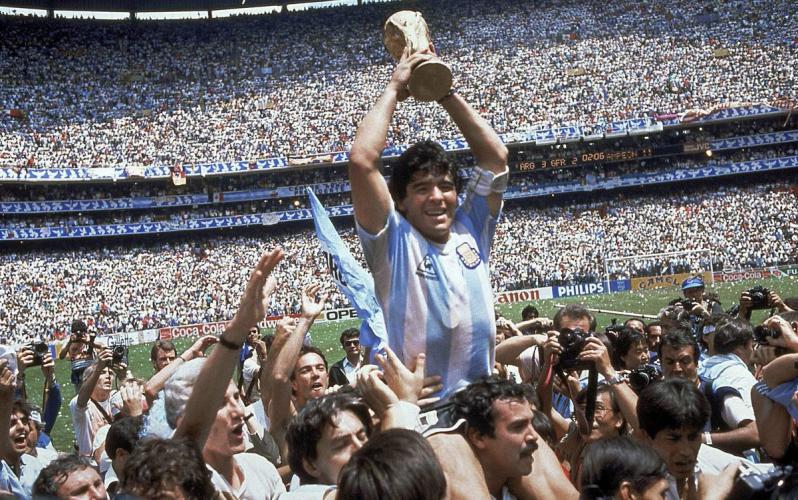
Diego Maradona led Argentina to the 1986 World Cup. Photo: @RoyNemer | Twitter
Argentina in 1986 was Diego Maradona, but also so much more than Diego Maradona. Yes, El Pibe de Oro scored five goals and won the Golden Ball, but Jorge Valdano added four goals and the Argentine defense allowed 0.71 goals per match. Maradona didn’t even score in the 3-2 final win over West Germany.
After a 1-1 draw with reigning champion Italy in the group stage, Argentina reeled off five straight wins in Mexico to win it all, including the memorable quarterfinal victory over England.
Oh, and yeah, that Maradona guy was pretty good, scoring both goals for La Albiceleste in both the quarterfinals and semifinals.
No. 4 — Brazil 1958
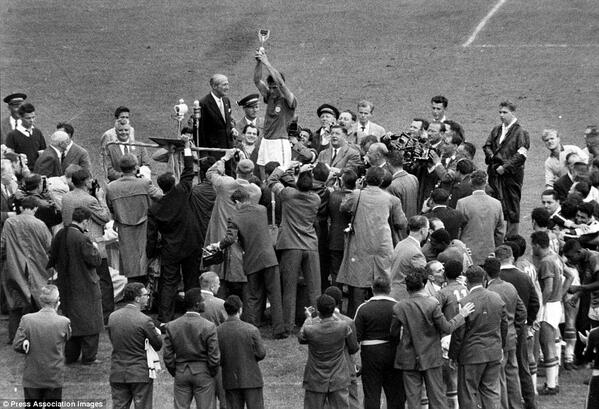
Somehow, it wasn't until the sixth World Cup that Brazil finally won its first. Photo: @BeyondTLM | Twitter
Pelé burst onto the scene as a 17-year-old and scored six goals, including two in the final, to lead Brazil to its first ever World Cup title.
This Brazil team had plenty of attacking verve, with Vavá (five goals) joining Pelé on an offense that scored 16 goals in six matches. The Seleção outscored their semifinal and final opponents by a combined 10-4.
The defense was also impressive, allowing four goals all tournament. Of particular note, Brazil allowed Just Fontaine to score just once in their semifinal matchup. Fontaine scored 12 goals in his other five matches that year because he was just out of his mind.
Best of all for Brazil, this sparked a run of three World Cup titles in four tournaments, only interrupted by the great Eusébio in 1966.
No. 3 — Spain 2010
Some might argue Spain should be higher, but it would be just as easy to argue for a lower ranking. Spain’s first World Cup winners came from play that was as beautiful as it was pragmatic, scoring just eight goals but always looking impossible to beat.
La Furia Roja in 2010 were in the midst of a four-year run in which they won the Euros twice and the World Cup thanks to a strong defensive corps and a sublime midfield. Iker Casillas, Sergio Ramos and Carles Puyol manned the back while Xavi and Andrés Iniesta controlled the tempo of a match like never before. David Villa scored just enough up front for Spain to record four straight 1-0 victories in the knockout rounds.
Spain actually lost 1-0 to Switzerland in its first match before regrouping. After a 2-1 win over Chile to win the group, La Furia Roja did not allow another goal in an incredible display of defense by possession. Perhaps most impressive was Spain’s semifinal win over Germany, which had just routed Argentina 4-0.
While Spain’s play was a sight to behold, Vicente del Bosque’s men often sacrificed attacking intent for defensive possession and thus did not dominate on the scoreboard as some might have expected from this brilliant group of footballers. This resulted in Spain recording the joint lowest goal differential (plus six) of all World Cup winners. But it still stands as one of the most cohesive groups to ever win the World Cup.
No. 2 — Brazil 2002
To be honest, it’s tough to rank the best Brazil teams of all time because they’re all just so freakin' good. Brazil in 2002 was just unstoppable, becoming the first — and still only — team to go through the World Cup with seven wins and no losses.
Ronaldo scored eight goals, Rivaldo added five and a young Ronaldinho scored twice for a team that racked up 18 World Cup goals while allowing four. Though Oliver Kahn ultimately claimed the Golden Ball for helping Germany reach the final, he could do nothing to stop Ronaldo in the 2-0 defeat to Brazil.
In the knockout stages on the way to the final, Brazil beat Belgium 2-0, England 2-1 and Turkey 1-0.
No. 1 — Brazil 1970
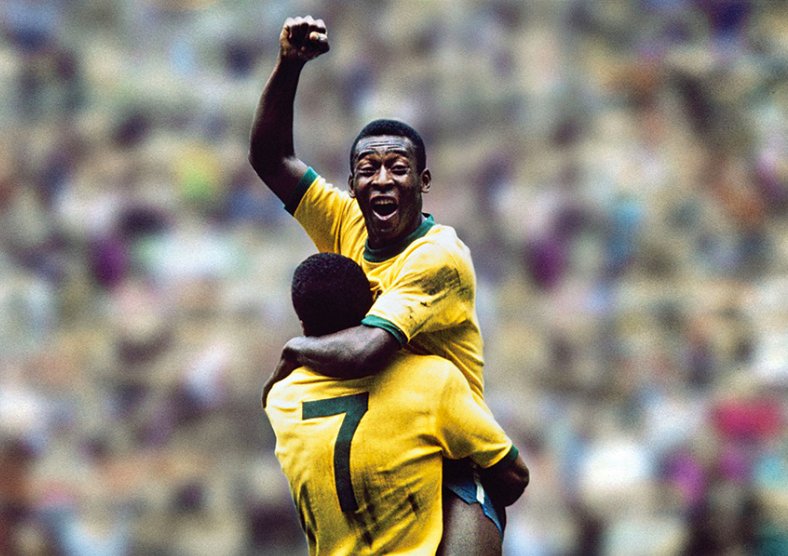
Pelé won three World Cups, his last coming with the most impressive of all World Cup winners. Photo: @Sporf | Twitter
The first World Cup shown on color TV featured the greatest World Cup winners the planet has seen decked out in luminous yellow kits. Led by Pelé (four goals) and Jairzinho (seven) on offense, the Seleção outscored opposition 19-7 in winning all six of their matches, the first team to do so in a single tournament.
Only two of Brazil’s wins were by one goal, group-stage wins over England (1-0) and Romania (3-2). In the knockout rounds, Brazil crushed the competition, knocking out South American rivals Peru 4-2 and Uruguay 3-1 before destroying Italy 4-1 in the final. This was the same Italy that had just beaten a West Germany side with Franz Beckenbauer and Golden Boot winner Gerd Müller 4-3 in the semifinals.
The final, in front of 107,412 fans at the Azteca in Mexico City, was football at its finest. Pelé opened the scoring within 20 minutes and Carlos Alberto closed it out five minutes from time with a brilliant team goal.
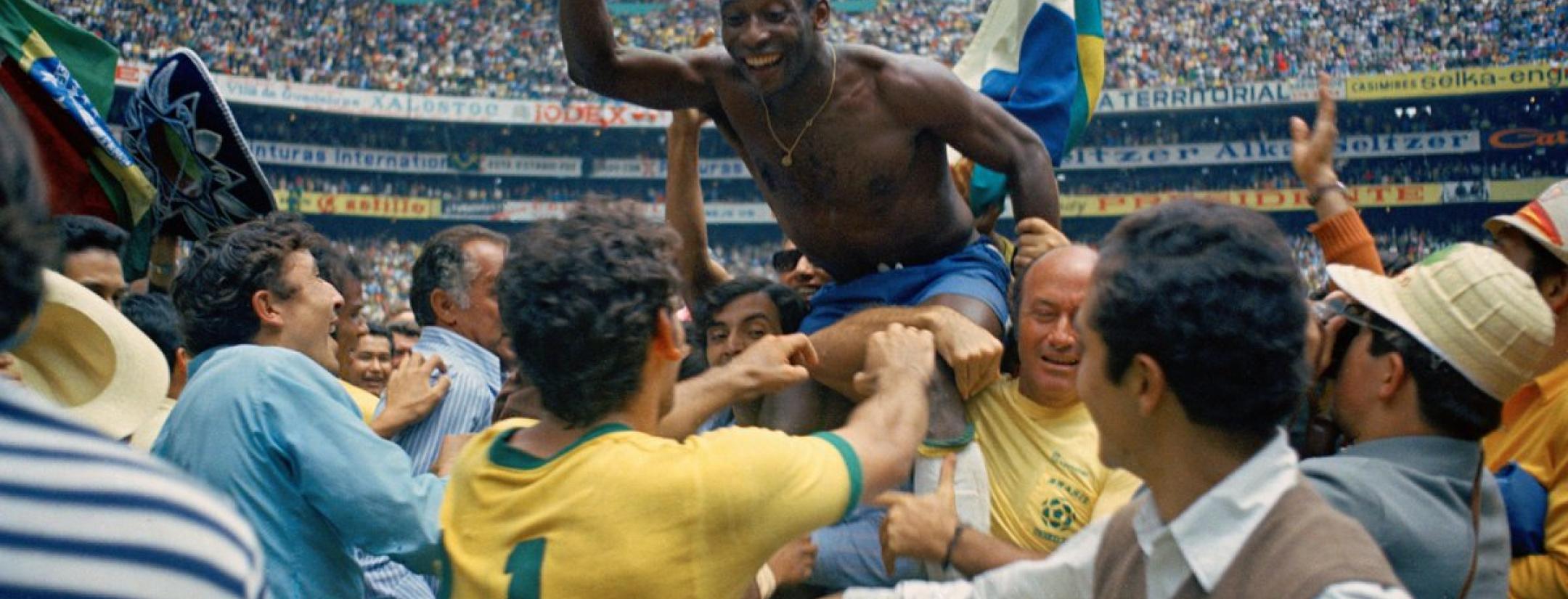
 The first World Cup winners
The first World Cup winners


